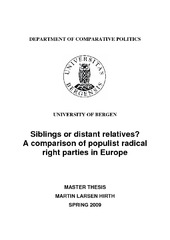| dc.description.abstract | This thesis has compared which political issues that mobilize voters for populist radical right (PRR) parties in Europe. The research question is Can populist radical right-voting be explained by the same political issues in Western and Central and Eastern Europe?" Recent theoretical development, by Pippa Norris and most notably Cas Mudde, claims that a pan-European approach is the most suitable way to conduct research on PRR-parties. This thesis sets out to perform an empirical test of their argument. If the pan-European approach holds true, it creates a major dispute within the literature of PRR-parties, especially with regards to the rule of inclusion in future research. It will also see, up until now, two separate party groups, populist radical parties of Western Europe and the more radical nationalist parties of Central and Eastern Europe, as one party family. The theoretical fundament is based on previous literature for PRR-parties, identifying which political issues that traditionally have been thought of as salient. In addition I have drawn on literature on the Central and Eastern Europe to identify issues that are stressed as important for PRR-parties in the region. Through a survey of the literature, I have constructed testable hypotheses for all issues connected to the PRR-parties. The thesis is of a quantitative nature, with logistic regression analyses as my method of choice. The analyses were conducted making use of data from European Values Study. The results showed that age and gender are significant characteristics for PRR-voters in the whole of Europe. Further on, immigration was confirmed as a salient issue for PRR-parties in Western Europe, but failed to yield a significant result in Central and Eastern Europe. Lack of confidence in the European Union is a political issue that mobilize PRR-voters all over Europe. More surprising is it that extremist attitudes towards minorities mobilize voters in both regions. The theoretical fundament argued that this would only be significant in Central and Eastern Europe due to a more radical political mainstream. Based on a higher number of significant variables, stronger effects of the variables and an overall higher probability of the Western European model, the thesis concludes that PRR-voting in Western Europe and Central and Eastern Europe is not explained by the same political issues. | en_US |
